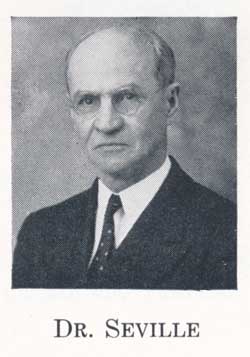This Day in Presbyterian History
Daily devotional readings in Scripture, the Westminster Standards, & Presbyterian history.
http://www.thisday.pcahistory.org/2017/03/march-18-4/

A visiting minister was asked to lead in prayer in Sunday school, and when he had finished, a teacher heard one of her girls whisper, “Gosh, what a prayer!” Such an exclamation seems incongruous in expressing one’s appreciation of a prayer, but a little thought will lead anyone to the conclusion that “gosh” is not an appropriate word for a Christian to use on any occasion whatsoever. When we look into the original meaning of such interjections, we may be surprised that even some Christian people are habitual users of expressions which the dictionary terms “minced oaths.”
A very commonly used interjection is “Gee.” It is capitalized in Webster’s New International Dictionary and given this definition: “A form of Jesus, used in minced oaths.” This derivation is even more apparent when the form “Yikes,” now frequently heard, is used. Two other common words and their definitions are these: “Golly—a euphemism for God, used in minced oaths; gosh, a substitute for God, used in minced oaths.” “Darn, darned, darnation” are said to be “colloquial euphemisms for damn, damned, damnation.” Persons who allow their lips to utter “Gosh- darned” quite freely would be shocked if they realized the real meaning of the word.
A certain minister, professor in a sound seminary, when he was a child was not allowed to use “goodness,” “mercy,” or “gracious” as exclamations. He was inclined to think the restrictions a family peculiarity, merely a parental overcarefulness, but now he can see that it had a sound Calvinistic basis. The Shorter Catechism asks, “What is required in the third commandment?” and then gives this answer: “The third commandment requireth the holy and reverent use of God’s names, titles, attributes, ordinances, words, and works.” Certainly goodness is an attribute of God. Read more at http://www.thisday.pcahistory.org/2017/03/march-18-4/
Daily devotional readings in Scripture, the Westminster Standards, & Presbyterian history.
http://www.thisday.pcahistory.org/2017/03/march-18-4/

A visiting minister was asked to lead in prayer in Sunday school, and when he had finished, a teacher heard one of her girls whisper, “Gosh, what a prayer!” Such an exclamation seems incongruous in expressing one’s appreciation of a prayer, but a little thought will lead anyone to the conclusion that “gosh” is not an appropriate word for a Christian to use on any occasion whatsoever. When we look into the original meaning of such interjections, we may be surprised that even some Christian people are habitual users of expressions which the dictionary terms “minced oaths.”
A very commonly used interjection is “Gee.” It is capitalized in Webster’s New International Dictionary and given this definition: “A form of Jesus, used in minced oaths.” This derivation is even more apparent when the form “Yikes,” now frequently heard, is used. Two other common words and their definitions are these: “Golly—a euphemism for God, used in minced oaths; gosh, a substitute for God, used in minced oaths.” “Darn, darned, darnation” are said to be “colloquial euphemisms for damn, damned, damnation.” Persons who allow their lips to utter “Gosh- darned” quite freely would be shocked if they realized the real meaning of the word.
A certain minister, professor in a sound seminary, when he was a child was not allowed to use “goodness,” “mercy,” or “gracious” as exclamations. He was inclined to think the restrictions a family peculiarity, merely a parental overcarefulness, but now he can see that it had a sound Calvinistic basis. The Shorter Catechism asks, “What is required in the third commandment?” and then gives this answer: “The third commandment requireth the holy and reverent use of God’s names, titles, attributes, ordinances, words, and works.” Certainly goodness is an attribute of God. Read more at http://www.thisday.pcahistory.org/2017/03/march-18-4/

